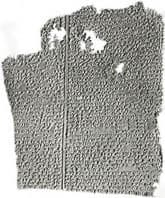Gilgamesh
Critique • Quotes • Translations
 Akkadian tablet, c.1300–1000 BCE
Akkadian tablet, c.1300–1000 BCEAlso known as
The Epic of Gilgamesh; He Who Saw the Deep
First publication
c. 2100–1200 BCE
Literature form
Poetry
Genre
Literary, epic, mythology
Writing language
Akkadian
Author's countries
Sumer, Babylon
Length
11 chapters
Filling in the gaps...or not
Translators have studied all the ancient Gilgamesh-related works, or fragments of works, as they have been brought to light.
We now have about two-thirds of the Standard Version of the epic, about half of the Old Babylonian epic preserved in up to eight versions, fragments of the Middle Babylonian epic from at least seven sources, and five of the Sumerian poems that provided some of the earliest written contributions to the eventual epic.
Complete new translations of the epic, including the latest uncovered material, have appeared regularly, either with or without the controversial twelfth chapter. For the lacunae (gaps in the available source material), translators have often inserted relevant words, lines and verses from earlier versions of the epic or from the Sumerian poems.
Some chunks are still completely missing in all versions though.
The first lines of Gilgamesh in three English translations:
Sandars
I will proclaim to the world the deeds of Gilgamesh. This was the man to whom all things were known; this was the king who knew the countries of the world. He was wise, he saw mysteries and knew secret things, he brought us a tale of the days before the flood. He went on a long journey, was weary, worn-out with labour, returning he rested, engraved on a stone the whole story.
George (Standard Version)
He who saw the Deep, the country's foundation,
[who] knew ..., was wise in all matters!
[He] ... everywhere ...
and [learnt] of everything, the sum of wisdom.
He saw what was secret, discovered what was hidden,
he brought back a tale before the Deluge.
He came a far road, was weary, found peace,
and set all his labours on a tablet of stone.
Mitchell
He had seen everything, had experienced all emotions,
from exaltation to despair, had been granted a vision
into the great mystery, the secret places,
the primeval days before the Flood. He had journeyed
to the edge of the world and made his way back, exhausted
but whole. He had carved his trials on stone tablets....
For a relatively up-to-date literal translation of the standard epic and all related material in verse form, see The Epic of Gilgamesh (1999, translated for Penguin Classics by Andrew George.
If you just want the story, you can try the easier-to-read version of The Epic of Gilgamesh (1972) by N.K. Sandars, also from Penguin. Based on previous translations, this prose rendition also has the gaps filled in for smooth continuity. This is the epic as you might have read it in college.
The most powerful rendering of the epic however may be Gilgamesh (2004) by Stephen Mitchell, who also doesn't translate a word himself. He takes seven existing translations, relying most on George's 1999 work, and rewrites the eleven-tablet epic in lively verse form.
Mitchell sees himself as continuing in the free creative tradition of Sin-liqe-unninni, reinterpreting and keeping alive the story for contemporary readers.
In this light, we may consider him the most recent in the line of Gilgamesh authors stretching back four thousand years.
— Eric

